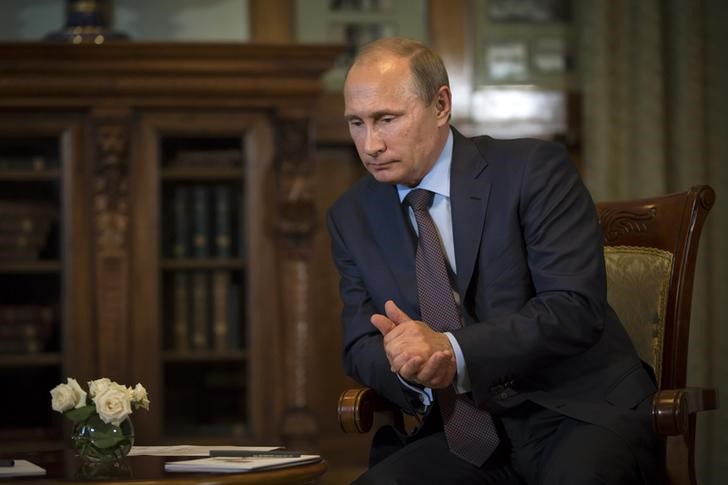By Timothy Heritage
MOSCOW (Reuters) - Russia failed to halt the collapse of the rouble on Tuesday, leaving President Vladimir Putin facing a full-blown currency crisis that could weaken his iron grip on power.
A 6.5 percentage point interest rate rise to 17 percent overnight failed to prevent the currency hitting record lows in a "perfect storm" of low oil prices, looming recession and Western sanctions over the Ukraine crisis.
Putin has blamed the rouble's crash on speculators and the West, while a presidential spokesman on Tuesday attributed the market turbulence to "emotions and a speculative mood".
The rouble
As Moscow faced up to the brewing crisis, U.S. Secretary of State John Kerry said sanctions could be lifted swiftly if Putin takes more steps to ease tensions and lives up to commitments under ceasefire accords to end the Ukraine conflict.
"These sanctions could be lifted in a matter of weeks or days, depending on the choices that President Putin takes," Kerry told reporters in London.
Keeping the pressure on Moscow, President Barack Obama was expected to sign legislation this week authorising new sanctions on Russia over its activities in Ukraine and providing weapons to the Kiev government, White House spokesman Josh Earnest said.
But he has said he does not want to take new steps that are not synchronised with European partners.
For the Russian economy, the currency crisis means a deeper recession is more likely next year as high interest rates will crimp growth. For businesses, it means more uncertainty and less access to funding. For the central bank, it means a credibility crisis.
For Putin, it increases the risk of losing two of the main pillars on which his support is based - financial stability and prosperity - and brings an unwelcome policy headache at a time when relations with the West are also in crisis over Ukraine.
"Putin rode the wave of higher oil prices in the years after he came to power, but there is no question that the economics will start to adversely impact the politics," said Nicholas Spiro, managing director of Spiro Sovereign Strategy in London.
"The pieces are falling into place to start to affect the political sustainability of this regime," he told Reuters.
Putin, who rose to power at the end of 1999, has enjoyed popularity ratings above 80 percent since Russia reclaimed the Crimea peninsula from Ukraine in March. He has no obvious rivals, with critics accusing him of smothering dissent, and much of the state's big business is in his allies' hands.
There has been little or no sign of panic from a public that gets most of its news from state media that propagate Putin's view that Russia is under attack from speculators and the West.
Unlike the scenes of chaos during the country's financial crisis in 1998, Tuesday morning saw no scramble at currency exchange points and no panic buying of food. There have been almost no protests.
But opinion pollsters say discontent with the rouble's fall and deepening economic gloom will gradually hit the emerging middle class in the big cities and then spread to his support base in the provinces.
"I think he has a store of support that can last 1-1/2 to two years," Lev Gudkov, head of the Levada Centre, an independent polling group, said by telephone. "We will see the first signs of discontent in the spring."
Putin is aware that his predecessor, Boris Yeltsin, resigned early after a financial crisis and that Soviet leader Mikhail Gorbachev's grip on power slipped as the economy crumbled.
LIMITED OPTIONS
Such a time frame means Putin, the government of Prime Minister Dmitry Medvedev and the central bank governor, Elvira Nabiullina, need to act fast. But their options are limited.
Medvedev met with top central bank and government officials on Tuesday to discuss the situation, according to the government's website.
The central bank has now made three significant interest rate rises in two months - 1.5 percentage points in October, 1 percentage point last week and the 6.5 points overnight.
But, the impact has been minimal.
Russian officials say the advantage of a weaker currency is that exports of oil, metals, grain and natural gas will earn more roubles than before - feeding government revenues.
But it makes international debt payments much more expensive in rouble terms and a credit crunch is looming in 2015, when Russian companies and banks are scheduled to repay $120 billion (£76.2 billion) in debts.
This will be even harder because access to global capital markets is restricted by sanctions over Ukraine, and year-end foreign debt redemptions are looming for this year as well.
Russian officials have said repeatedly the country will not impose capital controls although many analysts say this looks inevitable. Capital flight is expected to be far above $100 billion in 2014 and 2015.
But the central bank can ill afford to keep drawing on gold and foreign currency reserves to prop up the rouble. The reserves have already sunk to around $416 billion compared to more than $509 billion at the start of the year.
Putin is left relying on a sharp rise in the oil price. It is currently below $60 a barrel, while a price of around $100 is needed for the state budget to balance.
At a Moscow currency exchange kiosk, the money changer asked for 85 roubles for a dollar, though the rate given on the door was 80 and the official rate was 60.

"I can't keep up, changing the rates advertised. Things change every minute. People come and take whatever anyway. No one wants to be left with roubles now," said a worker, who declined to be identified, at one currency exchange point.
(Additional reporting by Elizabeth Piper, Alexander Winning and Lidia Kelly; Editing by Sophie Walker)